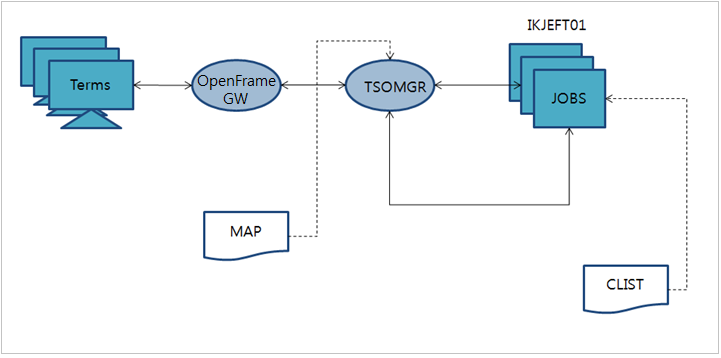Introduction
This chapter describes the basic concepts and functions of Time Sharing Option (TSO).
1. Features of TSO
Time Sharing Option (TSO) is a facility in which you can use commands and command procedures to process terminal I/Os, manage data sets, run a COBOL program, and perform other tasks. The TSO commands can be executed as a batch job in through JCL or through an interface for user interaction.
TSO provides the following functionalities.
-
Data Set Management
Listing catalog entries and deleting data sets.
-
Program Execution
Executing program libraries or executables.
-
Execution environment setting
Allocating or deallocating data sets and setting up the Work library.
-
Batch job control
Starting and canceling a batch job.
-
Display I/Os
Processing display I/Os.
-
Command procedures
Functions similar to a Unix shell’s internal commands, control statements, and environment variables.
2. TSO Screen I/O Architecture
In OpenFrame, TSO consists of the IKJEFT01 program, which executes TSO commands, and the TSOMGR server, which processes data I/O by screen. The IKJEFT01 program reads and executes CLIST and TSO commands specified in JCL. When CLIST contains a display call command such as EXCEFW, EXCEFI, and PANEL, or when a COBOL program calls the display screen through an IPF subroutine, IKJEFT01 invokes Tmax services from TSOMGR to pass data and parameters.
TSOMGR references a pre-compiled map file to put together information fields for a display screen and passes the field information to OpenFrame GW, which then displays the field information on the screen. If you enter input values on the screen, OpenFrame GW passes the values to TSOMGR, which then passes them to IKJEFT01 and proceeds with the next task.
The following figure illustrates the architecture of TSO screen I/O architecture.

-
OpenFrame GW
Passes user-entered input from a screen to TSOMGR. OpenFrame GW also receives data processed by IKJEFT01 from TSOMGR and displays the data on the screen.
-
TSOMGR
Receives data and parameters from IKJEFT01, references a pre-compiled mapping file, organizes the field information, and passes it to OpenFrame GW. If there is user-entered input, it is obtained through OpenFrame GW, and TSOMGR passes it to the application program.
-
IKJEFT01
When you connect to TSO on a terminal, TSOMGR executes your jobs such as displaying specific information or running a COBOL program. To process such jobs, IKJEFT01 analyzes CLIST scripts and executes specific TSO commands, which can call a screen or applications such as COBOL.
-
Command Procedure (CLIST)
CLIST is a list of TSO commands, which are read by IKJEFT01 line by line to be executed. With TSO commands, you can display certain information, run an application, manage data sets, and control batch jobs.
-
Map
A map file is provided to process data I/O by screen.